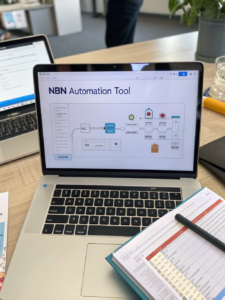Disrupt or Be Disrupted: FinTech’s Ongoing Revolution in the Banking Industry
The Future of Finance is Here: Navigating FinTech Disruption in Banking and Beyond The financial landscape is undergoing a seismic shift. Driven by technological advancements and evolving consumer expectations, the FinTech disruption banking industry is reshaping how we manage money, invest, and conduct transactions. From the rise of cryptocurrencies to the integration of AI, innovations are happening at an unprecedented pace. This isn’t just about faster payments; it's a fundamental reimagining of financial services. Understanding these changes is crucial, not only for financial professionals but also for anyone seeking to navigate the increasingly complex world of money. We'll delve into the core drivers of this revolution, explore promising opportunities – and potential pitfalls – across various areas, and offer insights into how to stay ahead of the curve. The Digital Transformation of Banking: A Necessary Evolution The digital banking transformation is no longer a strategic option, it's a survival imperative. Traditional banks are facing intense competition from nimble FinTech startups that offer specialized services, often with a superior user experience. This is prompting established institutions to invest heavily in technology to remain competitive. Key aspects of this transformation include: Mobile-First Approach: Consumers overwhelmingly prefer managing their finances through mobile apps. Banks are investing in sophisticated mobile platforms offering features like account management, bill payment, mobile check deposit, and personalized financial advice. You can learn more about the future of banking from resources like Deloitte's insights. Cloud Computing: Cloud technology provides the scalability, flexibility, and cost-effectiveness needed to support the growing demands of digital banking. It also enables banks to leverage advanced analytics and AI. API Integration: Application Programming Interfaces (APIs) are crucial for connecting banks with third-party services, creating a more open and integrated financial ecosystem. This allows for seamless integration of products like investment platforms, lending services, and payment gateways. Enhanced Cybersecurity: As digital transactions increase, so does the risk of cybercrime. Banks are investing heavily in cybersecurity measures to protect customer data and prevent financial fraud. Crypto Markets and the Expanding Financial Universe Cryptocurrencies have emerged as a powerful force, challenging traditional financial systems and presenting exciting opportunities for investors. Bitcoin, Ethereum, and a rapidly expanding ecosystem of altcoins are attracting mainstream attention. While the volatility is undeniable, the underlying technology – blockchain – has far-reaching implications for the future of finance. Decentralized Finance (DeFi): DeFi platforms are building decentralized financial applications, such as lending, borrowing, and trading, without the need for intermediaries like banks. This offers greater transparency and accessibility. Consider researching DeFi platforms like Aave and Compound to understand the movement. Stablecoins: Stablecoins, cryptocurrencies pegged to a stable asset like the US dollar, aim to reduce the volatility of the crypto market and provide a more reliable medium of exchange. Central Bank Digital Currencies (CBDCs): Many central banks around the world are exploring the possibility of issuing their own digital currencies. This could have a profound impact on the financial system. You can read more about digital banking transformation in connection with CBDCs from sources like the Bank for International Settlements. Regulation & Compliance: The evolving regulatory landscape surrounding cryptocurrencies is a key factor influencing their adoption. Governments are grappling with how to regulate this new asset class to protect investors and prevent illicit activities. AI Agents and Automation: The Rise of the Intelligent Financial Advisor Artificial intelligence (AI) is poised to revolutionize financial services, from customer service to investment management. AI agents and automation are enabling banks and financial institutions to: Personalized Financial Advice: AI-powered robo-advisors are providing personalized investment recommendations based on individual risk tolerance and financial goals. Fraud Detection: AI algorithms can analyze vast amounts of data to detect fraudulent transactions in real-time. Customer Service Chatbots: AI-powered chatbots are providing instant customer support, answering common questions, and resolving basic issues. Algorithmic Trading: AI algorithms are being used to execute trades more efficiently and make better investment decisions. Process Automation: Tasks such as loan application processing, KYC (Know Your Customer) compliance, and risk assessments are being automated using Robotic Process Automation (RPA) and AI. Feature Traditional Banking FinTech Banking AI-Powered Banking Customer Service Limited, phone-based 24/7 Chatbots, online Highly Personalized, proactive AI assistants Investment Advice Generic Personalized, algorithmic Deeply tailored, dynamic Fraud Detection Manual, reactive Advanced AI algorithms Real-time, predictive Process Efficiency Slow, manual Automated, streamlined Hyper-efficient, fully automated Alternative Investment Strategies: Beyond Stocks and Bonds Investors are increasingly seeking alternative investment strategies to diversify their portfolios and potentially enhance returns. This includes: Private Equity: Investing in privately held companies can offer higher returns than public markets but comes with higher risk and lower liquidity. Real Estate Crowdfunding: Platforms allow investors to pool their money to invest in real estate projects. Collectibles: Investing in art, antiques, and other collectibles can be a passion investment with the potential for appreciation. Impact Investing: Investing in companies and projects that generate positive social and environmental impact. This represents a rapidly growing area attracting both retail and institutional investors. Navigating the Future of the FinTech disruption banking industry The rapid advancements in technology are creating both opportunities and challenges for the financial industry. Staying informed about the latest trends is essential for anyone seeking to succeed in this evolving landscape. The adoption of digital banking transformation is just the beginning. As AI and blockchain technologies mature, we can expect even more radical changes in the years to come. What are your thoughts on the future of finance? Share your comments below! Want to explore more about FinTech disruption? Check out these related resources: FinTech Disruption Bank Innovation WordPress Format Considerations: This content is formatted to be directly copy-pasted into a WordPress editor. Headings: H2 and H3 tags are present for proper heading structure. Paragraphs: Short paragraphs enhance readability. Lists: Bullet points are utilized effectively. Links: All links are included with appropriate anchor text. Images: Image is included with alt text. Table: Includes a suitable table for comparison.
Share this content:














Post Comment